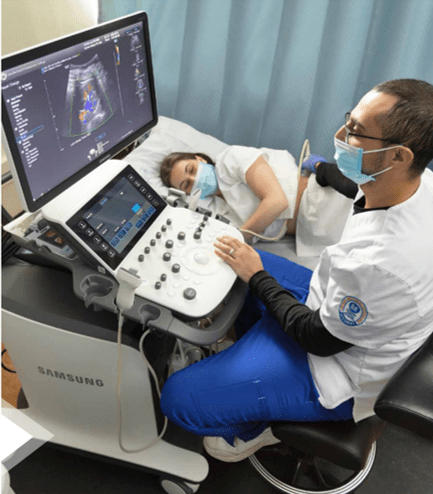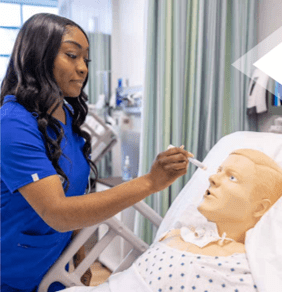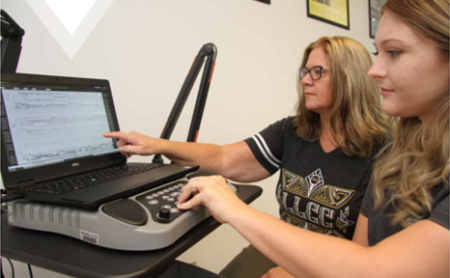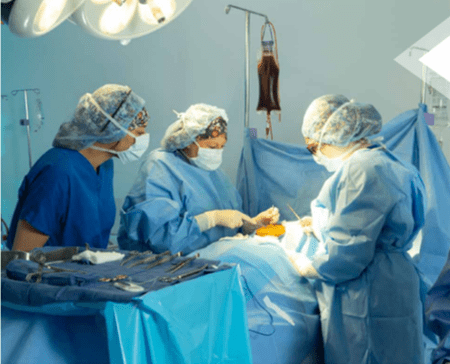New opportunities in health care training
Health care workers are making a difference every day in our communities.

“Whether you are looking to get a quick start in the health care field or want to take the next step in your career, LLCC has many training options to choose from,” says Dr. Cynthia Maskey, dean of health professions.
One of the newest programs LLCC has added to help current health care workers advance is vascular sonography, which takes a closer look at how blood flows in arteries and veins. This 10-month certificate program is designed for any currently working and registered general or cardiac sonographer who wants to add vascular ultrasound to their credentials.
“Our teaching is focused on real-world application. We have opportunities on campus, such as our students getting hands-on training in the sonography lab and in simulation and skill labs in our high-tech Nursing Education Center,” explains Dr. Maskey. “There are also opportunities with local health care facilities to do clinicals in many of our programs, including nursing, EMS, neurodiagostic and surgical technology.”
Students can even get paid to go to school. Grant-funded programs like the Workforce Equity Initiative (WEI) and Pipeline for the Advancement of the Healthcare Workforce (PATH) provide opportunities for free training and support for occupations within the health care field.
Training within reach

PATH is helping break down barriers to training for those already employed in the health care industry. It also is helping bring new workers into the industry with preference given to low-income, first generation and minority students. WEI aims to serve low-income students, 75% of whom must be African-American.
“I saw that the WEI program listed a lot of different courses for certifications, and I was interested in the health care field,” says Amaris Gaines, LLCC alum and certified nursing assistant (CNA), working with critical care patients. “They offer extra tools, financial help, as well as childcare … and that’s what helped me along the way.
“Even though it’s a short-term class, it opens the door for what you want to do long term … it’s within reach. You just have to go out there and get it.” Gaines says that walking into work now feels great. “You look forward to seeing the patients, the family members … It’s just a good feeling that you were a part of that person’s care plan.”
She plans on furthering her career with help from the PATH program and is currently back at LLCC taking pre-requisite classes for the LPN program.
Opportunities where you are

LLCC will soon be offering a shorter path to get started in neurodiagnostic technology (NDT) as an EEG technologist. The program will be offering a 12-month certificate option in addition to a two-year degree.
“EEGs are used to provide real-time physiological data to see how the brain is functioning,” explains Danie Valois, NDT student at LLCC. “With LLCC’s NDT program being one of only 23 programs across the country, we are a close-knit community … contributing to the improvement of the overall health care experience.”
Courses are offered in online and hybrid formats. “We’re meeting students where they are,” explains Diane Wilson, NDT program director. “This gives students the most flexibility to complete their coursework around the days they are in clinicals.” LLCC’s program currently has clinical sites in Springfield, Decatur, Peoria, Champaign and St. Louis.
“One area of increasing demand is for technologists working in the long-term monitoring of patients, which has led to an increase of positions for techs working from home,” says Wilson. “Technologists also work in hospitals, operating rooms, clinics, sleep labs, ambulatory companies and as travel techs.”
Making lives better

“The first time I heard of surgical technology was from a coworker when I was a CNA. I looked into it shortly after, and it was one of the best decisions I’ve made,” says Casey Kras, LLCC surgical technology student.
“I get asked all the time, ‘What is a surgical technologist?’ … I assist the surgeon. My duties in the operating room (OR) are to protect my patient, account for everything used in the case, pass sterile instruments and supplies to the surgeon and be as hands-on in the surgery as my scope of practice allows.”
LLCC’s surg. tech. lab is set up like an actual OR. “Being able to see and interact with all the equipment before being sent to clinicals sets every student up for success,” says Kras. “I find that having the lab portion and continuous support from the amazing instructors are invaluable and have led to my personal success within the OR. Being a part of a team that actively saves lives is incredibly rewarding.”
Story published in the LLCC FORWARD magazine, April 2023.
www.llcc.edu/healthcare
